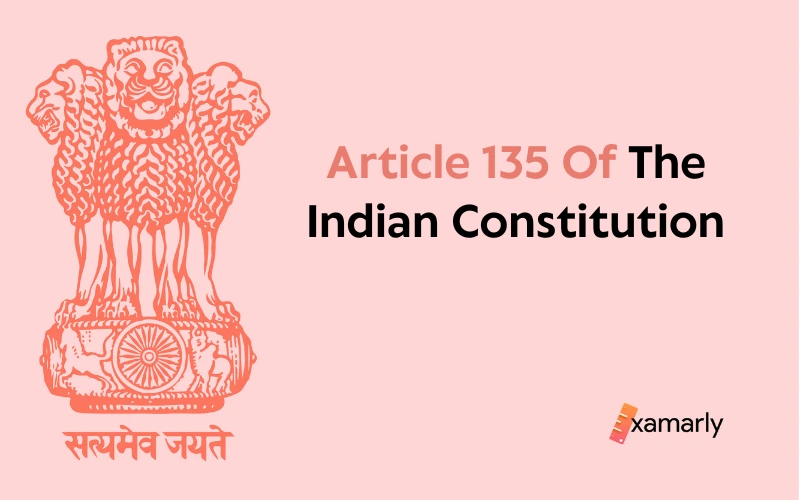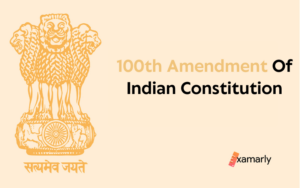The Federal Court’s authority and functions under current legislation are to be exercisable by the Supreme Court, according to Article 135 of the Indian Constitution.
The aforementioned article can be found in Part V of the Constitution.
The legal term denoting the legal authority bestowed to a legal organization to carry out acts of justice is known as “jurisdiction.”
This article will help you understand the provisions of Article 135 and what is the need to add the said article to the Constitution. For the preparation for competitive examinations like UPSC, this article is worth reading as it is found in the syllabus of Indian Polity.
Constitutional Provisions Of Article 135 Of The Indian Constitution
Until Parliament by law otherwise determines, the Supreme Court shall also have jurisdiction and powers in relation to any issue to which the provisions of article 133 of the Constitution or article 134 of the Constitution do not apply if jurisdiction and powers with respect to that matter were exercisable by the Federal Court immediately before the beginning of this Constitution under any existing law.
What Is The Need For Article 135?
When the Federal Court had jurisdiction to hear appeals, etc. from the High Courts under the previous law, article 135 was added to the Constitution to give the Supreme Court the ability to exercise jurisdiction in situations that were not covered by articles 133 and 134.
Even after the Federal Court was eliminated by Article 395 of the Constitution, the previously existing right of an aggrieved party to appeal persisted. Article 135 grants the Supreme Court the same authority and jurisdiction over any matter to which the provisions of articles 133 or 134 do not apply if the Federal Court had that authority and jurisdiction over the matter immediately prior to the Constitution under any applicable law.
Thus, if a decision made by a High Court in a case or action that was started prior to the Constitution’s inception satisfies the requirements for valuation under the legislation in effect at that time, an appeal from that decision may be made to the Supreme Court.
Key Points
- The right to appear before the Federal Court in cases where the parties had an automatic right to do so could not be revoked without justification just because the Supreme Court was established in place of the Federal Court.
- The term “Matter” undoubtedly has a broad meaning, and by giving it a liberal interpretation, it is possible to bring the inherent rights of appeal inside the scope of article 135 of the Constitution.
- Such jurisdiction and powers were “exercisable” in the sense that they might be used immediately following the entry of a judgment, decree, or final decision, provided that a plaintiff had previously accrued a vested right of appeal with regard to it.
- There is no justification for restricting the operation of article 135 to situations in which the right to appeal has already materialized in a concrete manner just prior to the Constitution’s inception.
- According to article 135, even if article 133 does not apply, it must nevertheless be determined whether the Federal Court was able to exercise the jurisdiction and authority in question immediately prior to the Constitution’s inception.
Conclusion
As long as our nation’s history of civilization, the Indian judiciary has existed. To get to where it is now, it went through various stages of evolution and development. The Federal Court of India served as India’s highest court of appeals for the longest period of time. This occurred when the British Empire ruled India.
The Federal Court of India was founded by the Government of India Act (1935) to serve as a last court of appeals and to have greater authority than all provincial courts (High Courts) in British India.
Even after India gained its independence, this concept persisted, and in 1950 the Indian Constitution created the Supreme Court of India to take the position of the Federal Court. Since then, the Supreme Court has maintained the rule of law in the nation and has the authority granted to the Federal Court of India by the purview of Article 135 of the Indian Constitution.
For Further Readings:
FAQs
What Is Article 135 Entails?
The Supreme Court of India is given the authority to exercise the federal court’s jurisdiction and powers under any pre-constitutional laws by virtue of the constitutional provisions of Article 135 of the Indian Constitution.
State The Different Types Of Jurisdiction Supreme Court Have.
Three types of jurisdiction that the Supreme Court posses are:
1. Appellate jurisdiction
2. Original jurisdiction
3. Advisory jurisdiction
Why Article 135 Is Included In The Indian Constitution?
Article 135 was added to the Constitution in order to allow the Supreme Court to exercise jurisdiction in situations not covered by articles 133 and 134, in respect of matters where the Federal Court had the power to hear appeals, etc. from the High Courts under the previous law.
Under Which Act Federal Court Of India Came Into Existence?
In India, in 1937, under the provisions of the Government of India Act of 1935, a judicial body known as the Federal Court of India was founded. The Federal Court of India had jurisdiction over original, appellate, and advisory cases. Up until 1950, when the Supreme Court of India was constituted, it was in operation. The Federal Court of India has the option of appealing to the Judicial Committee of the Privy Council in London.
What Article 133 Deals With?
According to Article 133 of the Indian Constitution, the Supreme Court has appellate authority in cases involving civil disputes that have been appealed from High Courts.
What Article 134 Of The Constitution Deals With?
In criminal cases, the Supreme Court of India has appellate authority under Article 133 of the Indian Constitution.






